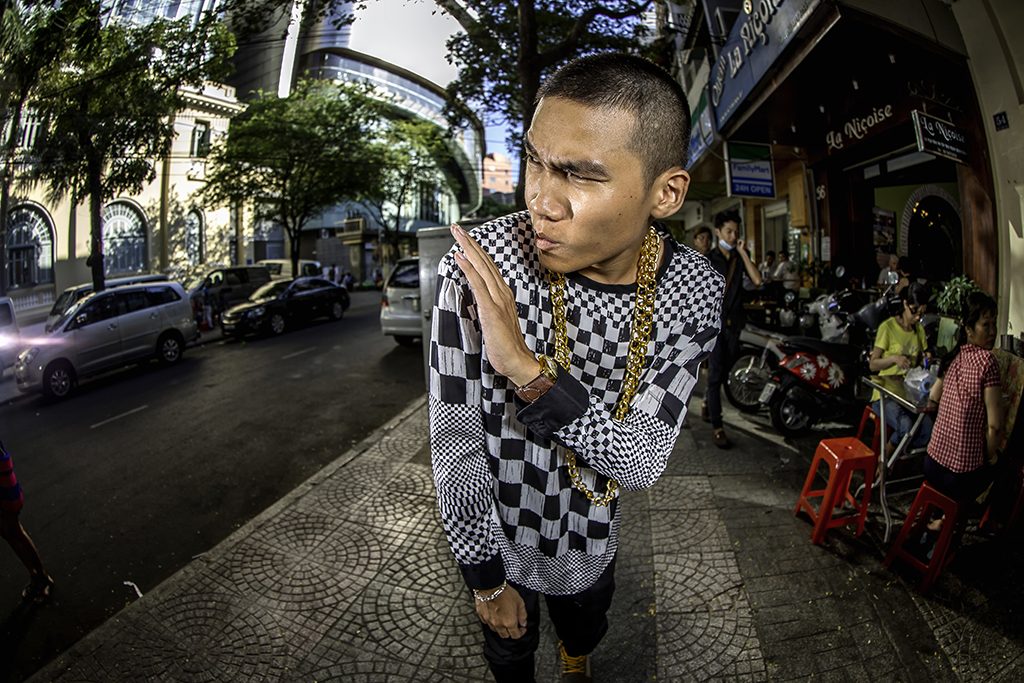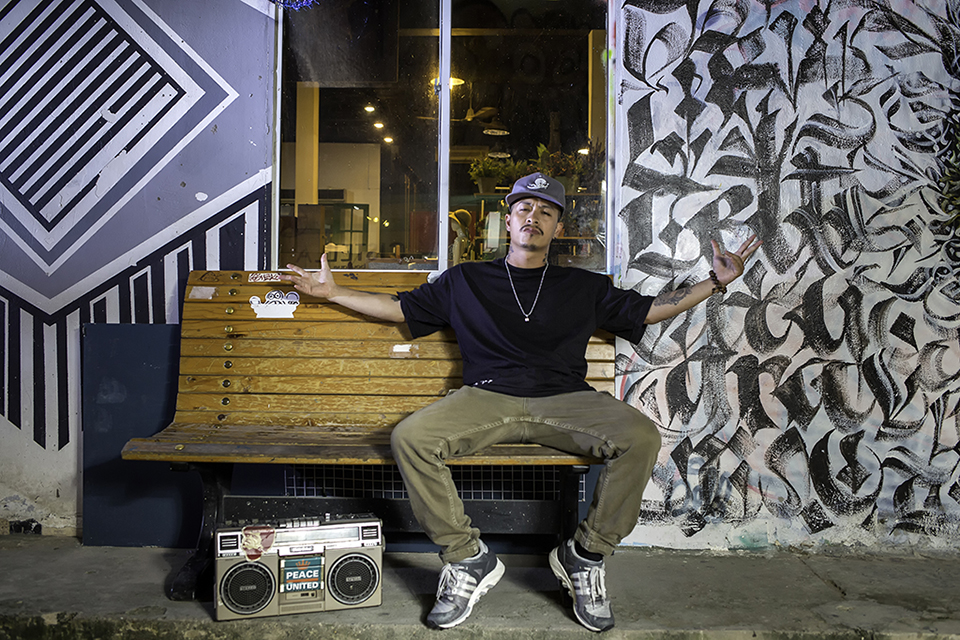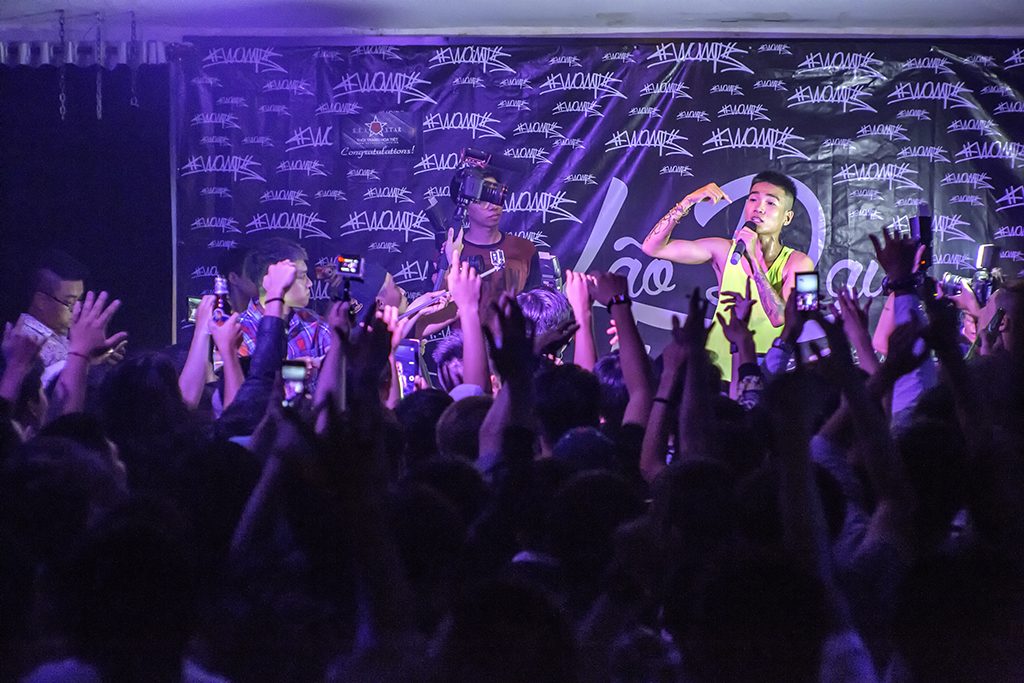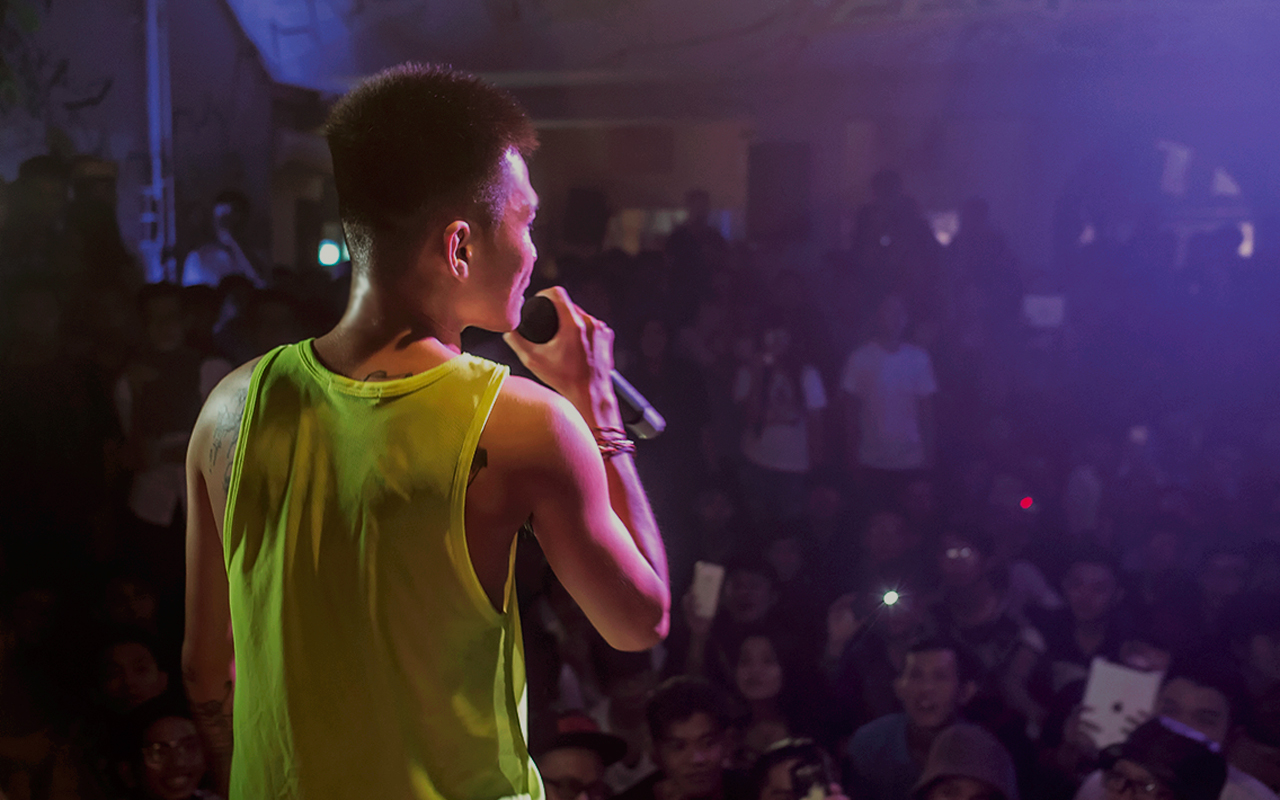When Vietnamese rapper Suboi gave an impromptu performance to US President Obama during his visit to the country in May 2016, the footage of the beatboxing president went viral and the Vietnamese hip hop star went global. She’s now the official face of Budweiser’s marketing campaign in Vietnam. It may have come as a surprise to many overseas spectators to see American culture (and the American President), being so wholly embraced in a country that was so heavily affected by US military action less than half a century ago.
After the fall of Saigon and South Vietnam to the communist North in 1975, the once popular Western styles of music brought over by US troops in the 1960s and 70s were rendered corrupt, anti-revolutionary, and illegal. Along with hundreds of thousands of refugees desperate to escape the austerities of communism, many of the Vietnamese artists who had been a part of Saigon’s own rock and soul scene throughout the war, fled to the USA in fear of their livelihoods, and their lives.
Much of those pre-1975 songs and recordings were destroyed, hidden or confiscated, and until 1986 even ballads and love songs were banned in favour of patriotic compositions recalling the glorious victories of war and of communism.
Change happens fast in Vietnam. Plagued by poverty, hunger and the threat of financial ruin in those post-war years, the ruling party took a conscious step back from hard-line communism in favour of reform and economic prosperity. The Doi Moi (or ‘renovation’) period began in 1986 and propelled Vietnam towards becoming the economic powerhouse it is today. Strict controls over private enterprise were relaxed while the doors to foreign trade and investment were flung open.
In addition to the flow of business suddenly taking place between America and Vietnam, the Vietnamese that had once sought refuge across the Pacific slowly began returning to the motherland, reuniting themselves with friends and family and bringing with them the tales and artefacts of their new adopted home. With candy and Pop-Tarts came music, and as the South Vietnamese of the 60s and 70s had once found Hendrix and The Doors, a new generation of a reunified Vietnam was being exposed to the music and cultures of the West. Through Salt-N-Pepa, Public Enemy, LL Cool J and N.W.A., Vietnam got it first taste of hip hop.
The 29-year-old began making music in his teens and has since amassed four albums, numerous collaborations, and an army of loyal fans. The Saigon native shot to fame after the release of his 2010 single, Khu Tao Sống, or ‘Where I Live’, a lament to life on the tough city streets. Featuring fellow Saigon rapper Karik, the accompanying music video has so far received over nine million views on YouTube.
“Shall we sit outside?” he says calmly, apparently unfazed by the cafe’s decor. Fresh from the set of a movie he’s working on, he needs coffee and a smoke. In jeans and a crisp clean sweater, Wowy Nguyen doesn’t immediately stand out as underground hip hop royalty. The larger-than-life character depicted in his music videos for tracks like Do Tao Làm and Khu Tao Sống, is an unmistakable trademark of the rapper’s brand, of the artist who once made a meagre living as a water delivery boy, yet the man sitting down with me today carries a polite, thoughtful, almost philosophical air of calm about his person. “Okay,” he says. “Let’s go.”
I didn’t understand them at the time, but the flow, the way they felt the music, it made me feel emotions that I needed to have in my life.

“Some kids, they grow up in the hood like me, they have to try hard to get money. Some kids don’t go to school, some kids don’t have clean water. For some, their parents hit them every day. I think rap music is something that can tell them, ‘Hey, you are not alone’.”
Using hip hop as a tool to help Vietnam’s street kids is a topic that came up when I interviewed the late Jerry Snell in 2015. The Canadian dance choreographer and hip hop veteran was visiting Saigon to promote his Street Art for Street Kids initiative, teaming up the country’s top street dance crews with shelters for vulnerable children to offer dance lessons and companionship. “Hip hop came from the street gangs of New York,” explained the then 56 year-old. “Then Afrika Bambaataa said, ‘Stop fighting, start dancing’. This was a solution that started happening all around the world.
“When people have got nothing to do, there’s going to be something bad coming out. Because people have energy, especially kids growing up, and if there’s nothing to do, that energy has to come out. The first thing about street art is that everybody can do it. You can draw, you can paint, you can talk, you can rap. You don’t need a special costume or special equipment.”
This is how Wowy’s career began in 2005, with a cheap MP3 player and a few tracks downloaded from the Internet. “The rappers from America,” he says, today speaking near-perfect English, “I didn’t understand them at the time, but the flow, the way they felt the music, it made me feel emotions that I needed to have in my life. People [around me] said, ‘The singer is not singing. Why is he just talking? Why are you listening to this?’ But I listened to it, and sometimes I’d try to say something to match the beat. One sentence. Only one sentence. I’d yell something, swear something. I felt like, ‘Woah, I can jump on the beat, it’s amazing.’ So I started making music.”
Back to the Source
At his clothing store near the edge of the Saigon river, I catch up with Viet Max, one of the country’s original B-boy dancers and now a successful film director, TV talent show judge, street artist and founder of the fashion label Peace United Streetwear (PUSW). The 38-year-old moved to Saigon in 2006 from his hometown of Hanoi. According to him, Vietnam’s capital is the original birthplace of the country’s hip hop scene.
“At my school in Hanoi, we organised a kind of block party where all of the people came to sing and to dance,” he recalls. “It was only disco dancing at that time [but] I saw some dancers in a circle trying to do the robot or waving like Michael Jackson, so I joined the circle. That’s how all of the guys around Hanoi started dancing. It wasn’t hip hop. We were just dancing.”
From this one tiny store, would-be Vietnamese hip hoppers like Max got their first tastes of Run DMC, Vanilla Ice and MC Hammer.

On the site of what is now a contemporary Vietnamese restaurant in the Hai Ba Trung district of Hanoi, an otherwise nameless business once whirred with the sounds of cassette tape players and VHS machines, churning out copy after copy of foreign recordings carried into the country in the suitcases of businessmen and students travelling back and forth from abroad. “It was a very famous shop,” says Max. “The guy had connections around the world, so he would get tape or a video and copy it over and over to sell.”
Being the only outlet of its kind in the city, Viet Max considers the shop at 49 Quang Trung Street to be a historic landmark in the story of Vietnamese hip hop. “At that time, the records and tapes were considered artefacts,” he says. “They were really hard to find.”
From this one tiny store, would-be Vietnamese hip hoppers like Max got their first tastes of Run DMC, Vanilla Ice and MC Hammer. “At High School proms,” he says, “students would do popping to P.M. Samson’s We Love to Love. We called it Flexible Dance back then.”
Inspired by the music videos accompanying these seminal hits, Vietnam’s original street dance crews slowly came together. Big Toe, now the grandaddies of B-boying in Vietnam, formed in 1992 as the first hip hop club appeared at the Vietnam-Soviet Cultural Friendship Palace in Hanoi. “It wasn’t secret,” says Max, “but it was, kind of quiet, kind of rare.”
1995 brought MTV to Southeast Asia and unprecedented access to the sights and sounds of America. The Notorious B.I.G. was topping the US hip hop Billboard charts with One More Chance/Stay With Me, soon to be followed by Coolio’s Gangsta’s Paradise which became one of the most played music videos of the year.
Viet Rap Arrives
Born in Nashville in 1983 to Vietnamese parents, Thai Minh Ngo spent his teenage years living in Portland against a backdrop of gang violence and crime. Thai Viet G, as he became known, started his musical career by rapping his own lyrics over tracks by US artists like Eazy-E and Tupac. Thai’s first album, Portland Love, was released in 2001 and featured the single Vietnamese Gang. Originally released in 1997, the track, a vitriolic chant about gang life, features both English and Vietnamese lyrics and became the first known example of Viet Rap committed to tape.
“It’s the Vietnamese gang that I bang with, ride with the same click.
Giết mấy thằng nào tao không biết.
(Kill you whoever you are)
Bắn hết tụi mày tao không tiếc.
(Shoot y’all I won’t regret)
Four-five with two clip, we true Viet.
Đặc biệt, không thể nào bị giết, không thể nào bị tiệt.
(Above all, we can’t be wiped out, can’t be extinct)”
The Vietnamese sections were rapped by Saigon-born Khanh Nho and caused a ripple of excitement throughout the Vietnamese communities living in the US. Back in Vietnam, the song gained an almost mythological status.
Back on the balcony of She Cafe, with the afternoon’s rainstorm now settling in, Wowy recalls the first time he heard it:
“One day, my sister called me over. She said, ‘Hey, I have something very cool.’ She played me Thai Viet G. I thought, wow. This was the first time I’d heard something so strange and so different. [It was] very raw, very real. There was something I could understand.”
Wowy explains how his next move was to find a copy of his own. “I went to the store and I told them, ‘Hey, you have Vietnamese Gang? Some stores, they didn’t know what this was, [but] some were like, ‘You want it? You really want it?’
‘Yeah, yeah, I want it.’
‘Okay, wait five minutes.’
They’d make me wait outside, they’d go inside, then,
‘Okay, here, and don’t tell anyone you got this CD from me!’”
With little money and very few outlets selling American music in Saigon (and even fewer selling gangster rap), the rapid uptake of the Internet came just at the right time for the young Wowy. From 1.3 million users in 2001, the figure had reached 10 million by 2005. As YouTube was launched, around 12.7 percent of Vietnam was online.
From accessing new music to broadcasting his own, Wowy, like many other rappers around him, owes his career to the Internet.
The Game Changers
The arrival of online video streaming services provided a free platform for Vietnam’s dancers and rappers to broadcast and access tracks and videos while subtly side-stepping government censors and official lines of broadcast. 2005’s Rap Club is My Club, (still available on YouTube today), by D-Cash, Lil’ Knight, Young Uno and NamCT represents one of the earliest Viet Rap recordings to come out of the country itself. Elsewhere in the world, other first and second generation Vietnamese living abroad were emerging onto the scene, with artists like Viet Dragon from Australia and the Euro-based German Viet Rap group making waves in Vietnam and in their own satellite communities.

At first, when we didn’t know hip hop, we copied what we saw in the music videos … and we didn’t always know what they meant
Like most foreign musical genres trickling into Vietnam at the time, hip hop was still very new and those early days focussed more on imitation than innovation. I ask Wowy how, coming from such a poor neighbourhood in a land vastly different to America, he was able to relate to the ‘glamorous’ gangster lifestyles being depicted in US rap videos of the time.
“At first, [what I saw on] the TV impacted me a lot,” he replies. “I thought that was what was cool—the bling bling, the cars, the girls, the parties. I loved to rap about that, about Lamborghinis in my neighbourhood or something like that. I made a song about it and I played it to my friend, Tuan Andrew (now a famous international artist). He couldn’t understand it because I was talking about things I didn’t have. I felt a bit of… shame.”
“[Then] he showed me Tupac and Biggie and underground rap. I thought, oh my god, there is another way. He told me that rap music is very free; you can talk about anything. I thought, okay, in my life I have a lot of things to talk about and to explore. From then, I used my life as material for my music.”
Viet Max echoes these sentiments. “We are living in peace, not war,” he says. “The cultures in the US and in Vietnam are very different. We knew that. At first, when we didn’t know hip hop, we copied what we saw in the music videos—the hand signals, the gestures, the fashions—and we didn’t always know what they meant, but we didn’t want to get guns and shoot [each other].”
With memories of war still vivid for many Vietnamese, plus the country’s deep-rooted attachments to the Buddhist and Confucian ideologies of love, respect and honour for oneself and one’s family, Vietnam’s youngest hip hop generation continues to use the culture and lifestyle as a vehicle for good.
Since Khanh Nho (the collaborator on Vietnamese Gang) released Đời Anh Thanh Niên (‘Life of a Youngster’) in 2005, a track and accompanying music video recalling the horrors of war and Khanh Nho’s family’s escape to the USA in the 1970s, Vietnam’s aspiring rappers have been on their own path, rapping about their own concerns, their own issues and their own lives.
“Rapping in Vietnam is very peaceful,” adds Max. “There are some ‘dis’ raps, but not too much. We still have some problems, for sure, but we have this all around the world. The meaning of hip hop is peace, unity, love and having fun.”
“Vietnamese rappers mainly like to rap about life,” says Adrian Rodgers, or ‘Pain’, a Scottish rapper and producer who has been living, working and performing in Saigon since 2010.
“They really like rapping about love and girls and life, in a softer way,” he adds. “There are a lot of love tracks out there. Yeah, there are gangs, but rappers are not really out there counting bodies. They’ll have the occasional fight but compared to what there is [in Scotland], it’s very chilled out.”
Going Viral
Saigon-born Hang Lam Trang Anh, otherwise known as Suboi, may be Vietnam’s most famous hip hop music star of the moment. As is the case for many musical artists of the 21st century, her success is best measured in YouTube views and Facebook followers than record sales. Both figures run in to the millions.
When the 26-year-old rapper took the microphone and asked the US President about the importance of promoting arts and culture, she was first invited to show off her talents. Obama gave a brief demonstration of his beatboxing skills, their interaction went viral and soon the international media came knocking on Suboi’s door.
What was less widely reported, however, was his actual answer to the question, which raised once again the issue of continued media censorship and human rights in Vietnam:
“Imagine if at the time that rap was starting off that the [US] government had said ‘no, because some of the things you say are offensive, or some of the lyrics are rude, or you’re cursing too much. You’ve got to let people express themselves.”
For the time being at least, metaphors are a rapper’s best friend in Vietnam. Whether they’re sticking it to the man or talking about sex and drugs, everyone seems to find a way to avoid unwanted government attention. For Rodgers and his band, Hazard Clique , politics simply isn’t their thing. “The way we rap is never attacking authority,” he says. “We might have a couple of things to say, but we’ll always phrase it differently. But there’s no need for it. That’s not something we want to rap about.”
For Son Nguyen, however, a Saigon-born rapper who goes by the name Nah, his track DMCS, or ‘Địt Mẹ Cộng Sản’, is a direct attack on the Vietnamese regime. The title translates, quite simply, to ‘Fuck Communism’.
Writing in the Seattle Times shortly after its 2015 YouTube release, the rapper, also an Oklahoma State University student, spoke of the need for Vietnamese citizens to follow his example and speak out against corruption and government brutality, but also acknowledged the risks.
“Since the release of DMCS three months ago,” he writes, “I have become concerned about my family’s safety. I am studying in America, but my parents and younger brother are still in Saigon.”
Nah’s fears are understandable. Musician Viet Khang was sentenced to four years imprisonment in 2012 for far subtler criticisms of the ruling party in his songs. “It’s certain that if I go back, they would punish me [too],” adds Nah.
While he lists Eminem, Tupac and The Notorious B.I.G. among his many influences, Wowy is fiercely proud of the music and poetry buried deep within Vietnam’s cultural history, a history written by artists who, like him, were also subject to restrictions on what they could and couldn’t say.
“In Vietnam, a long time ago,” he says, cooly drawing on his cigarette, “we had a lot of poets, people who wrote about their lives. People like Ho Xuan Huong (1772 to 1822). She wrote about her sexuality, but at that time people didn’t agree with what she was doing, because she was a lady. But look at her now, she has a street named after her. So I think, fuck them, we can do whatever we like.”
History may hold the secrets to Vietnam’s past, and its future, but for the present its hip hop community will keep on doing its thing, all in the name of peace, unity, love and fun.






